Empire
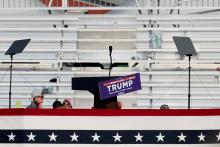
“It’s a shame he missed.”
That was the first thought I had when I saw that someone had attempted to assassinate former President Donald Trump. My second thought was, “You shouldn’t think that — you consider yourself a peacemaker and pacifist.” I wondered how my Christian commitments could erode so quickly.
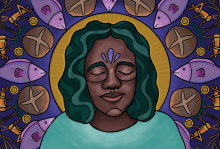
IN HIS 2013 book The Great Divergence: America’s Growing Inequality and What We Can Do About It, Timothy Noah notes that the personal income of the top 1 percent in the United States began to increase exponentially beginning in 1979, a peak year in what economists call the “Great Inflation” (1965-1982). While there has always been economic stratification in the U.S., the “great divergence” in American’s incomes began at the end of the 1970s, and the wealth gap has continued to grow. In 2019, people in the top 1 percent of income distribution held more than 33 percent of the total U.S. wealth — up from 27 percent in 1989, according to a Congressional Budget Office report. Families in the bottom half held only 2 percent of the total wealth. The U.S. has policies that protect wealth and others that depress wages and hinder affordable housing. This combination increases poverty. Unfortunately, false narratives still circulate about the causes of poverty, blaming the poor and pitting communities against each other.
From another point of view, acceptance of wealth disparity, and the policies that cause it, is a result of failed imagination: We accept increasing wealth disparity because we cannot envision another way. As people of faith, we are called to be God’s prophets and seers — to see the possibilities of God where others cannot. The church’s task is to challenge empire’s narratives about what is possible, to actively cultivate what biblical scholar Walter Brueggemann calls a “prophetic imagination” for a different reality and empower communities to embrace it.
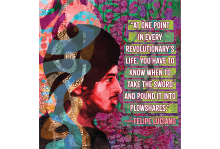
Sojourners had a wonderful in-person retreat this spring in Washington, D.C. Our gathering of editorial colleagues from California, Washington, Georgia, New Jersey, and D.C. sparked creativity, deepened commitment and community, and increased our love and respect for one another and our readers. Unfortunately, we also shared COVID — so we delayed the printing of this issue by a week to allow for rest and healing. (Hopefully, you didn’t notice.)
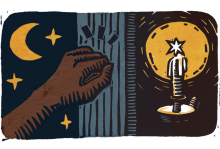
RARELY DO YOU see powerful people advocate for the benefit of others outside their “own” political or economic group. There is a tendency on the part of the elite to leverage their privilege for their own benefit while disguising it as public good, as the concept of “elite capture” has exposed. And the state is often complicit in reinforcing policies and practices that concentrate resources into the hands of those who already have enough. In a 1962 sermon titled “A Knock at Midnight” (see Luke 11:5-6), Martin Luther King Jr. diagnosed the state of the nation and church saying, “It is midnight in the social order.” He urged the church to respond to the oppressed who “knock on the door,” even when it’s inconvenient. “How often has the church left [people] disappointed at midnight, while it slept quietly in a chamber of pious irrelevancy,” preached King.
Despite decreasing numbers, the U.S. church wields enormous political and economic power. This month’s readings showcase people — the powerful and the not so powerful — who exercise their agency for the good of those who seemingly have little to offer in return. The texts highlight the church’s moral and theological imperative to employ its power to open the door to the ones who desperately knock. Will the church that gathers in the name of Jesus ignore the state’s complicity in oppressive structures or will it act as the “conscience of the state,” as Dr. King urged? Does the church privilege its own comfort or does it attend to the vulnerable, even at the risk of its own interests? King concluded, “the greatest challenge facing the church today is to keep the bread fresh and remain a Friend to [humanity] at midnight.”
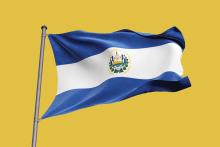
IN 2016, our church in San Salvador was preparing to host a group of young adults on a “mission trip” from the United States. Just prior to their travel, the U.S. government suspended the Peace Corps program in El Salvador due to security concerns related to gang violence. As the host church, we decided the mission trip should be canceled too. In 2015, the murder rate in my country peaked at 103 per 100,000, making it the most dangerous country in the world.
Over the last seven years, El Salvador has seen a rapid drop in its murder rate. In early 2023, President Nayib Bukele claimed that the country had accumulated 365 nonconsecutive days with zero homicides since he took office in June 2019. While it’s impossible to independently corroborate Bukele’s claim, it’s undeniable that Salvadorans are experiencing a new sense of safety and “peace.” That sense of peace, however, has come at a grave cost.
As of January 2023, El Salvador had the highest incarceration rate in the world. Approximately 61,000 people, including 1,082 minors, have been swept up in mass arrests since March 2022, when congress allowed Bukele to suspend constitutional rights. Salvadorans no longer have rights to free assembly, due process, access to lawyers, and previously protected freedoms. Nearly two percent of the Salvadoran adult population is in prison in conditions that fail to meet the U.N.’s minimum standards for imprisonment. Cristosal, a civil society human rights organization in El Salvador, has documented the death of 153 prisoners in state custody between March 2022 and March 2023, all detained during the same period. Of those, 29 died violent deaths and 46 “probable violent deaths” or under “suspicions of criminality,” reported Cristosal. More reports continue to roll in of the deaths of incarcerated people who also show signs of torture.
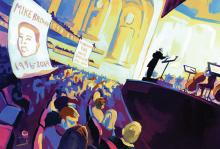
IN FALL 2014, the St. Louis Symphony Orchestra performed Brahms’ Requiem on a Saturday evening two months after the murder of Michael Brown Jr., at a concert hall about 10 miles from Canfield Green, where Brown was killed and his adolescent body left out in the Missouri August sun for four and a half hours.
That summer and fall, people in the city and county of St. Louis lived in the tension of waiting — we were waiting for a grand jury to make a decision. Not a verdict about the officer’s guilt: The grand jury was tasked with deciding whether this murder was even a murder at all — whether anything happened on Aug. 9 that could even be considered maybe a crime. Maybe worth investigating. Or whether it was just a regular day’s work.
As intermission was ending and folks were back in their seats, just as the orchestra was regathered and the conductor was raising his baton, a small group of ticketholders in the audience stood up and sang. In singing, they asked the audience, made up largely of people who could choose whether or not they were impacted by the grand jury’s decision that loomed over the city like the shadow of death, to make a decision of their own. They stood up, one by one, and joined their voices in an old labor song: “Which side are you on, friend, which side are you on?” they sang. “Justice for Mike Brown is justice for us all. Which side are you on, friend, which side are you on?” They hung banners made of bedsheets over the balcony; one that echoed the piece being performed that evening was painted: “Requiem for Mike Brown, 1996-2014.”
These protesters brought this question — this disruption — into a space that could’ve kept it to business as usual. They sang the two refrains in repetition, almost like a Taizé chant, for several minutes, then they left the hall together, chanting a chant that at the time was still brand-new to most Americans: Black Lives Matter.
The disrupters left to a mix of silence and applause from the audience and the musicians. The concert continued, but the question hung in the air. It’s the same question that hangs in the air of many of Jesus’ disciple-calling stories, and it’s certainly the question that pervades Matthew’s telling of Jesus’ good news.
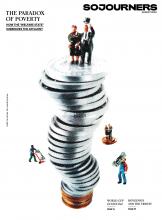
How the “welfare state” is designed to subsidize affluence rather than fight poverty.
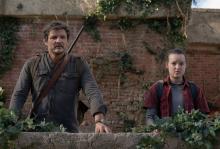
HBO’S BIGGEST POST-APOCALYPTIC SHOW, The Last of Us, imagines a brutal world — and the mushroom zombies are only occasionally the source of danger. The first season followed Joel (Pedro Pascal), as he escorted teen Ellie (Bella Ramsey), who is immune to the zombie infection, to a hospital that can turn her immunity into a cure. In the final episode [SPOILERS], Joel and Ellie reach their destination. But when Joel learns they can only manufacture the cure by killing Ellie, he kills the doctor who was set to operate on Ellie. Joel’s decision raises the question: If the world can only be saved by sacrificing the innocent, is it a world we want to save? The Last of Us, itself an adaptation of a beloved video game, is far from the first show that employs apocalypse to interrogate our morality. Our end-time imaginings can show us who we are ... and who we could be.
The Greek title of the last book in the New Testament canon is Apokalypsis (“apocalypse”), the best English rendering of which is “revelation.” Revelation isn’t about the end of the world. It’s about a revelation — an unveiling. Revelation is one example from the genre of books we call apocalyptic literature. The genre, popular among Jews and Christians for hundreds of years before and after Jesus’ life, usually features a human receiving a message from some sort of divine messenger. The messenger wants to show the listener some deeper truth about the world — something that helps the audience participate more faithfully in the new world God is bringing forth.

A STORM BLOWS through Weyes Blood’s fifth album, And in the Darkness, Hearts Aglow. A cold front of disillusionment meets the swirling tones of songwriter Natalie Mering. The effect is gorgeous and staggering.
Sounding both in and out of their time, these songs fuse darkly majestic orchestral arrangements with pop elements such as drum machines, synthesizers, and the occasional guitar. If history took a later start, this could be our classical music. Weyes Blood (pronounced “Wise Blood,” a nod to Flannery O’Connor’s novel set in the “Christ-haunted” South) has said that she craves sanctuary acoustics.
Billowing and hymn-like, “God Turn Me Into a Flower” is the album’s truest prayer. “It’s good to be soft when they push you down,” Mering sings. She sings to stand firm, but never aspires to twist into bramble: “... it’s such a curse to be so hard / You shatter easily and can’t pick up all those shards.”
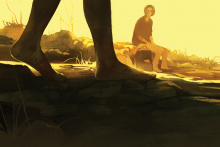
APRIL 2019. On the second day of our 65-kilometer walk on the Jesus Trail in Galilee, I began feeling dizzy and faint. Berry, my hiking partner, told me to drink more water. That helped, and we were able to make our way from Nazareth to our next stop in Cana, site of a wedding Jesus attended.
But the Jesus Trail continued, often on narrow stony paths speckled with animal droppings, up and down hillsides, across streams of springtime water where thistles grew over our heads, through meadows of waist-high grasses, and finally up and over Mount Arbel leading down to the Sea of Galilee. Our destination was Capernaum, site of Jesus’ headquarters during his ministry.
Exhausted at the end of our hike and with blistered feet, I turned to Mark’s gospel. Already in 1:21, Jesus “went to Capernaum”; the next morning he “went to a deserted place to pray” (verse 35). Then he “went throughout Galilee, proclaiming the message” (verse 39). I will never read the words, “Jesus went” the same way again. Not by horse, carriage, automobile, train, or plane. Not communicating by telegram, radio, phone, email, YouTube, or Zoom. Just trudging by dusty, sandaled feet, bereft of Nikes!
‘Lords of the world’
SINCE THAT HIKE, I have been pondering the Incarnation. Was it necessary for the Infinite One to go that far down? To be born a lower-class, brown-skinned, black-haired Middle Eastern Jew whose only means of transport was by scratched and calloused feet? To live under an enemy occupation determined to keep its subjects poor and politically powerless?
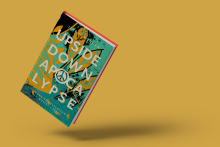
REVELATION IS AN intimidating book of the Bible to understand, let alone apply to everyday life. Dense with symbolic imagery and metaphors, it has been subject to innumerable interpretations and far-flung theories. But what are we to make of startling moments in the text, like when Jesus regurgitates a sword or John eats a scroll? In Upside-Down Apocalypse: Grounding Revelation in the Gospel of Peace, author Jeremy Duncan walks readers through Revelation by drawing parallels between the genres and figures of speech of John’s day and ours, lending clarity to how John’s apocalypse is deeply steeped in Jewish literary tradition and Roman culture. When we ignore this context, we miss the point of the final book of the New Testament: Revelation is not the wrathful reckoning of a conquering king; rather, as Duncan writes, it’s a testament to “how the Prince of Peace turns violence on its head once and for all.”
With each chapter, Duncan decenters “chrono-centric” approaches to Revelation, encouraging readers to avoid reading the text as “a story about me and my world and my time exclusively.” As the perfect, timeless witness of God, Jesus must be the guiding principle by which we understand all of scripture. Only then can we appreciate how God’s kingdom in Revelation contrasts with earthly kingdoms fueled by oppression. “[E]very time you awaken to how empire is trying to steal your imagination and make you believe in violence,” Duncan writes, “you have rightly interpreted Revelation regardless of the time period in which you awake.” Revelation asks us to watch for injustice, wherever and whenever it appears.
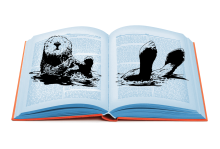
TOURISTS SPOTTED OTTERS in the Potomac River this spring. Not unheard of, but rare.
North American river otters are the only otter species in the Chesapeake Bay watershed. For millennia they were an apex species that served as “doctors” for healthy ecosystems by maintaining population levels of fish, frogs, and insects. The Colonial-era transnational fur trade, and its modern-era descendants of land destruction and water pollution, brought otters to the brink of decimation.
Now the otters are returning, a signal that decades of reparatory work to protect the Chesapeake watershed is having modest success.
The word most associated with these agile water weasels is “play.” Play is a fundamental way of interacting in the world; it’s how creatures “practice into being” what we can only imagine at first. Play develops communal trust, agility, resilience, strength, and strategy—and situates the soul firmly in the individual and social body.

I FIND MYSELF thinking about the significance of “firsts,” the role of faith in the morality of the nation, and the place of race and gender in that project. Vice President Kamala Harris’ ascent to one of the highest seats of political power is historic, unprecedented, and awe-inspiring. Like Barack Obama before her, it is a first that has ushered in, for many, a renewed faith in the nation. Multiply the emotional impact of that first by whatever number captures the firestorm of the past four years, and that faith easily transforms into a belief that “morality” has been secured and that things are going to be, basically, okay.
This train of thought is, I believe, dangerous and wrong. I do not discount the feelings Harris evokes. The emotional impact of Harris’ election registers for me very personally as a Black woman. When I initially heard that Joe Biden and Kamala Harris had won the election, my first thought was exhilarated shock at Trump’s defeat. Then, as that fact sunk in, I realized that this outcome meant the election of a woman of color—a Black woman, a woman of South Asian descent—to the vice presidency of the United States. Weeks later, the words still seemed somewhat strange, as if my brain was having trouble wrapping itself around the reality. My inability to readily speak her new position reflects to me the depth of her significance, and the change it portends for how I and future generations of Black and brown girls and women will be able to envision and speak of ourselves. I pause, however, at the unexamined triumphal connections being made between Harris, morality, and political futures.
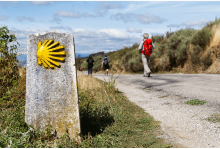
FOR AGES, THOSE living as monks, cloistered nuns, hermits, and wandering pilgrims have mastered the art of turning loneliness into solitude, creating a real presence to themselves, and to God. These spiritual explorers were often confined—as many of us are now—into narrow spaces, yet pilgrimage to the authentic self explores an interior landscape. The exterior pilgrimage often reflects the interior path of spiritual imagination conducted in confinement. Their lessons and practices are not cloistered today; they offer liberating tools that can resurrect and protect the space for real presence for all who desire detachment from the omnipresence of screens. Simply consider this: You can’t walk on unexpected pathways while looking at screens.
Untethered from normalcy
Pilgrims move in two directions at the same time—an outward direction toward a holy destination and an inward journey seeking an encounter with the sacred. Two of the best academic scholars of pilgrimages, Victor and Edith Turner, explain it in this one sentence: “Pilgrimage may be thought of as extroverted mysticism, just as mysticism is introverted pilgrimage.”
Pilgrimages, they suggest, were, and are, no walk in the park, or plain, or mountain. Embarking on such a journey, we become untethered not just from our physical normalcy. These uncertain, trusting steps also move us out of our spiritual familiarity. The pilgrim is invited not only to walk out of boxes of dogmatic beliefs but also to walk away from practices of comfortable spirituality.
This article is adapted from Without Oars: Casting Off Into a Life of Pilgrimage (Broadleaf Books, November 2020).
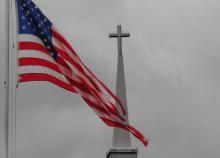
Partisans use Romans 13 to baptize their politics as being “ordained by God.” But Christians who reference Romans 13 typically do so using an us vs. government relationship. But unlike the first century when Roman rulers were mainly determined by heredity, lineage, or brute force, today we are the government. There is no us vs. them because we play an active role in how our government works and is run.
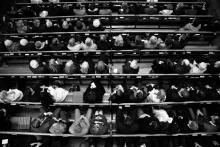
But once back in America, these very same Christians will adamantly oppose having “foreigners” as neighbors, loathing the idea that they could possibly be allowed to cross into the border of the United States seeking a better life. So while they post pictures on social media of themselves surrounded by poor children and holding babies they personally cared for, they’ll post nothing about the children and babies being separated from their parents at the border.

My obsessive inner nerd rose to attention. You couldn’t have seen resurrection in Jesus Christ Superstar because there was no resurrection in Jesus Christ Superstar. That was the point! [I online shouted.] That’s why some considered it scandalous — a very human Jesus, a Judas who makes a lot of sense if you listen to him, and no Jesus rising from the dead. It doesn’t deny the resurrection. It just stops beforehand

Jesus told his disciples to “take up their cross and follow me” a year before his trial and execution. And his disciples at that time would have heard it very differently from the way we interpret it today. To the disciples, a cross wasn't a symbol of atonement, forgiveness, or forbearance — it was an official mode of execution, by oppressors and occupiers. It was an instrument of terror. Jesus' words to the disciples were not just a warning. They were an exhortation to follow him anyway, in complete defiance of the very worst anyone could possibly do to us.
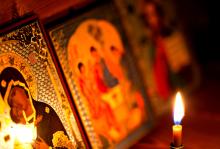
We feel the darkness all around and need to see some light. We feel hopelessness every day and need some hope. We feel despair for our nation’s life and future and need to see and hear some truth. We see authoritarian political leadership on the rise, a White House that literally puts democracy at risk, and feel the need to make clear where true authority lies.
But Christmas says ...
